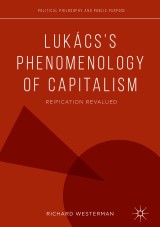Details

Lukács's Phenomenology of Capitalism
Reification RevaluedPolitical Philosophy and Public Purpose
|
90,94 € |
|
| Verlag: | Palgrave Macmillan |
| Format: | |
| Veröffentl.: | 14.08.2018 |
| ISBN/EAN: | 9783319932873 |
| Sprache: | englisch |
Dieses eBook enthält ein Wasserzeichen.
Beschreibungen
This book offers a radical new interpretation of Georg Lukács’s <i>History and Class Consciousness</i>, showing for the first time how the philosophical framework for his analysis of society was laid in the drafts of a philosophy of art that he planned but never completed before he converted to Marxism. Reading Lukács’s work through the so-called “Heidelberg Aesthetics” reveals for the first time a range of unsuspected influences on his thought, such as Edmund Husserl, Emil Lask, and Alois Riegl; it also offers a theory of subjectivity within social relations that avoids many of the problems of earlier readings of his text. At a time when Lukács’s reputation is once more on the rise, this bold new reading helps revitalize his thought in ways that help it speak to contemporary concerns.<br>
<div>1. Introduction: The Lukács Debate.- 2. Reality And Representation In Art.- 3. The History Of <i>History & Class Consciousness</i>.- 4. The Forms Of Social Reality.- 5. The Interpellation Of The Subject.- 6. Self-consciousness And Identity.- 7. The Social And The Natural.- 8. Conclusion: Lukács In Late Capitalism.<br></div>
<b>Richard Westerman </b>is an Associate Professor at the University of Alberta, Canada. He completed his PhD at Cambridge, before a postdoctoral fellowship at the University of Chicago. His work is primarily on Lukács and the Frankfurt School, and he has also published on philosophical aesthetics.
<div>This book offers a radical new interpretation of Georg Lukács’s <i>History and Class Consciousness</i>, showing for the first time how the philosophical framework for his analysis of society was laid in the drafts of a philosophy of art that he planned but never completed before he converted to Marxism. Reading Lukács’s work through the so-called “Heidelberg Aesthetics” reveals for the first time a range of unsuspected influences on his thought, such as Edmund Husserl, Emil Lask, and Alois Riegl; it also offers a theory of subjectivity within social relations that avoids many of the problems of earlier readings of his text. At a time when Lukács’s reputation is once more on the rise, this bold new reading helps revitalize his thought in ways that help it speak to contemporary concerns.</div>
Offers one of the first full-scale accounts of Lukács’s Heidelberg Aesthetics in English. Reveals the links between Lukács’s account of society and his philosophy of art. Applies Lukács’s thought beyond the paradigm of class conflict, showing what it implies for analysis of human domination of nature, and the notion of rationality as such.


















